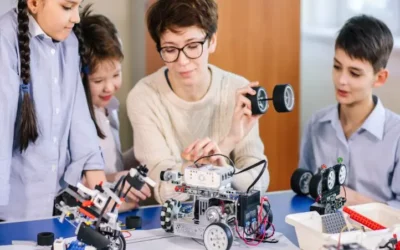Robotics clubs for kids are a gateway to a world of innovation and skill development. These groups promote creativity, problem-solving, and teamwork, all of which are important in today’s tech-driven society. Children who participate start on an exciting adventure that provides them with lasting skills, preparing them for a future in which robotics will continue to alter our environment. These clubs are not just about robotics but about nurturing young minds for a brighter tomorrow.
This blog delves into the enthralling world of Robotics Clubs for Kids. These clubs serve as dynamic hubs of learning, innovation, and skill development, sparking the interest of young minds in technology and robotics. Discover why these groups are important and how they give youngsters crucial experiences and growth possibilities in today’s tech-centric environment.
Table of contents
The Robotic Revolution:
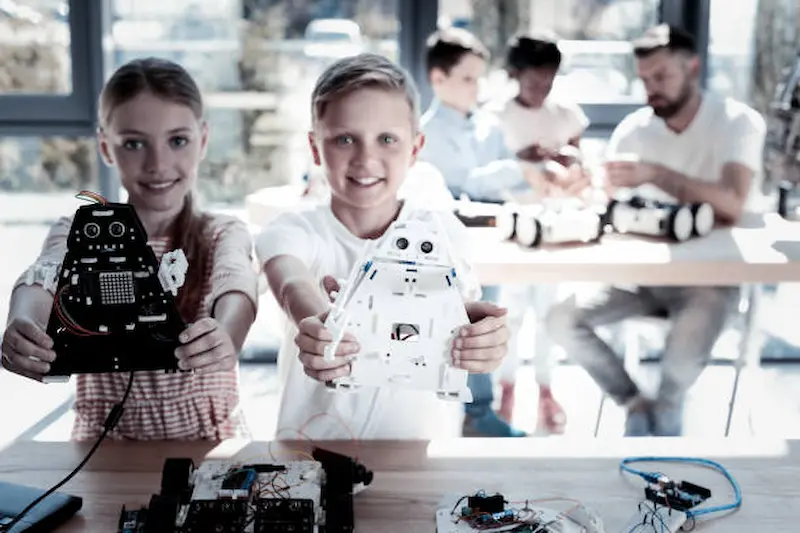
Today, the word “robot” isn’t just for sci-fi stories anymore. It’s all around us, making a big impact on things like factories, hospitals, and schools, even in fun stuff like cool robot toys for kids. If we want to understand why robots are such a big deal, let’s start by finding out where they came from.
A Brief History of Robotics
Robotics has its roots in ancient civilizations, where automatons and mechanical gadgets captivated intellectuals and inventors. However, robotics did not emerge as a science and engineering subject until the twentieth century. Pioneers like Isaac Asimov and inventors like George Devol and Joseph Engelberger paved the way for today’s robots.
The Role of Robotics in Our Daily Lives
From manufacturing and logistics to healthcare and entertainment, robots have infiltrated nearly every facet of our existence, including robotics for kids online.
They assemble cars on factory floors, perform delicate surgeries with precision, and even entertain us as companion robots. The impact is undeniable, making robotics a crucial driver of technological advancement.
Why It’s Essential to Introduce Kids to Robotics Early
Introducing kids to robotics early is crucial in preparing them for the future through robotics classes for kids. It nurtures creativity, problem-solving skills, and a deep understanding of technology. By engaging with robots, children not only gain valuable STEM knowledge but also develop critical thinking and teamwork. In this rapidly changing world, robotics education empowers the next generation to thrive in an increasingly roboticized society.
The Benefits of Robotics Clubs for Kids:
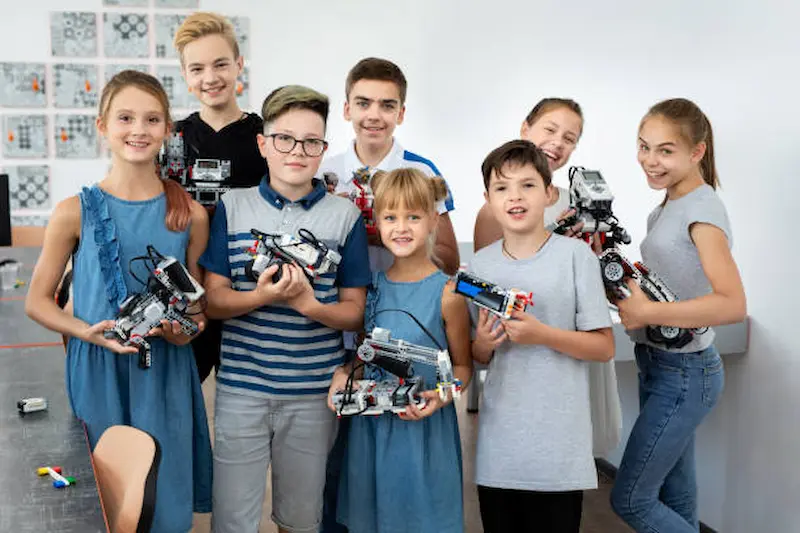
1. Developing problem-solving skills
Robotics clubs provide a dynamic learning environment that benefits young minds in a variety of ways, including the development of critical thinking skills for kids. For starters, they develop problem-solving abilities by providing real-world issues that necessitate creative answers. Children learn to analyze problems, design tactics, and troubleshoot, abilities that will serve them well beyond robotics.
2. Fostering creativity and innovation
Children’s creativity and inventiveness bloom as they create and build robots. They acquire hands-on experience, which sparks their imaginations and fosters a love of creativity. Furthermore, collaboration and communication skills are developed as club members cooperate on projects, learn to successfully exchange ideas, and work collaboratively.
3. Preparing for future career opportunities
Finally, these groups prepare children for future careers in sectors such as robotics for kids. In a world that is becoming increasingly reliant on technology, the skills learned in robotics clubs provide doors to a variety of professions ranging from engineering to artificial intelligence, ensuring that they are well-prepared for the challenges of the future.
Finding the Right Robotics Club:
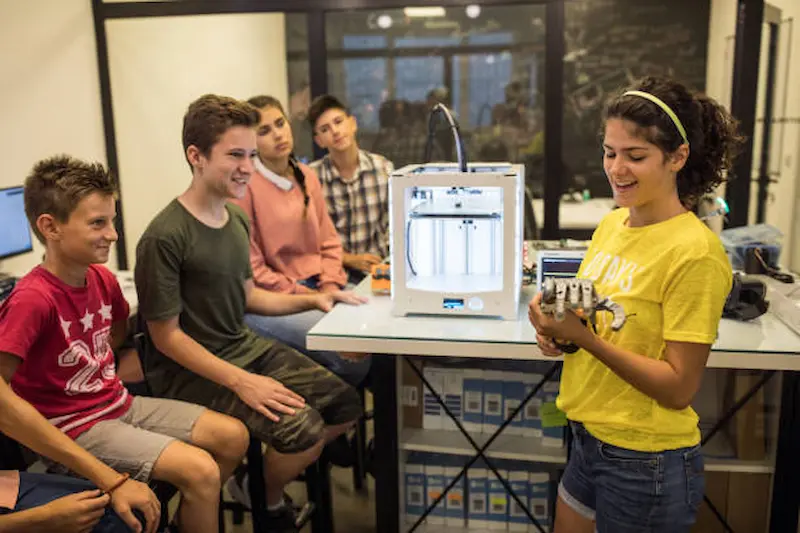
It is critical to select the best robotics club for your youngster. Begin by assessing your child’s age, degree of expertise, and hobbies. Investigate local clubs, schools, and community agencies that provide robotics programs. Look for experienced mentors, tools, and a welcoming learning atmosphere. Attend open homes or club meetings to get a sense of the mood and curriculum. You may ensure that your child finds the ideal robotics club that matches their objectives and aspirations by carefully examining your selections.
Top Robotics Clubs for Kids:
Club A: TechWizards Robotics Club
TechWizards Robotics Club is a well-known program that emphasizes hands-on learning. They provide an extensive curriculum that includes coding, mechanical design, and electronics. Their annual robotics tournament allows schoolchildren to put their talents to the test in interesting challenges. Parents and children praise the club’s committed mentors, who offer personalized instruction. “TechWizards transformed my child’s interest in robotics into a passion,” one parent said.
Club B: RoboGenius Kids
RoboGenius Kids specializes in teaching robotics to younger children, making it an excellent choice for those new to LEGO robotics for kids.
Building robots using LEGO Mindstorms and understanding fundamental programming ideas are among their fascinating pastimes. The club’s inviting atmosphere is appreciated by parents, and one child stated, “I love RoboGenius because it’s like playing with toys that come to life!
Club C: STEM Explorers Robotics
STEM Explorers Robotics distinguishes itself by emphasizing STEM integration and delivering STEM activities for elementary students. They provide projects that connect robotics to real-world applications, allowing for a more in-depth understanding. “STEM Explorers Robotics has significantly improved my child’s problem-solving skills and school performance,” one parent said of the club’s commitment to academic enrichment.
Success Stories:

In this captivating chapter, we delve into the inspiring journeys of children who have reaped the benefits of robotics clubs. Through insightful interviews, we uncover how these clubs have profoundly impacted their lives.
- Meet Sarah, whose participation in a robotics club ignited her passion for engineering. She now aspires to develop cutting-edge technology for sustainable energy solutions.
- Then there’s Alex, who found his voice and confidence while working on robotics projects. His journey from introverted to team leader showcases the transformative power of these clubs.
These young innovators represent a generation empowered by curiosity, problem-solving skills, teamwork, and leadership skills for kids, highlighting the incredible potential nurtured within the world of robotics clubs. Their stories testify to the boundless possibilities that await those who embrace STEM education.
Tips for Parents:
This chapter offers indispensable guidance for parents looking to nurture their child’s interest in robotics.
- Supporting Your Child’s Interest: Practice positive parenting by encouraging your child’s curiosity through access to robotics kits, online courses, and local clubs. Engage in conversations about their projects, showing genuine interest in their discoveries. Be their cheerleader and celebrate their successes.
- Creating a Robotics-Friendly Environment: Designate a dedicated workspace for robotics experiments, ensuring access to tools and materials. Foster a creative atmosphere where mistakes are opportunities to learn. Encourage responsible use of technology and prioritize safety.
- Balancing Robotics with Other Activities: While robotics and activities for kids are valuable, encourage a well-rounded life. Help your child strike a balance between robotics, academics, physical activities, and social interactions. This holistic approach ensures a healthy development path.
By following these tips, parents can provide a solid foundation for their child’s robotics journey while promoting a balanced and fulfilling childhood.
A Bright Future in Robotics:

The future of robotics holds incredible promise. As technology continues to advance, robotics, along with AI for kids, will play an increasingly pivotal role in our lives. Job opportunities in fields like robotics engineering, AI development, and automation are projected to grow significantly. By nurturing a passion for robotics in children today, including AI for kids, we’re preparing them for these exciting career prospects. As they embark on their journey in robotics, they’re not just learning; they’re shaping the future of technology and innovation.
Conclusion:
Robotics and robotics clubs provide numerous advantages to children. These groups provide hands-on construction, coding, and problem-solving experiences, growing critical STEM abilities. They promote teamwork, creativity, and critical thinking in addition to technical expertise. By developing an early interest in robotics, children not only prepare for future employment prospects in a technologically advanced environment but also get the confidence and tools to face real-world obstacles. Joining a robotics club opens the door to a more promising and innovative future.
To get your hands on more educational and free resources on coding for kids, robotics for kids, financial education for kids, etc., do check out the BrightCHAMPS Page now!
To get your hands on more such educational and free resources on coding, robotics, game development, etc., do check out the Brightchamps Blog Page now!
Frequently Asked Questions ( FAQs )
A1. Robotics clubs for kids are groups that teach robotics skills and teamwork, fostering STEM interest.
Q2. How can my child benefit from joining a robotics club?
A2. Your child can gain problem-solving, coding, and STEM skills, as well as teamwork and creativity.
Q3. Are there any age restrictions for kids to join these clubs?
A3. Age restrictions vary, but many clubs welcome kids from elementary to high school ages.
Q4. Where can I find the best robotics clubs for kids in my area?
A4. You can find the best robotics clubs for kids in your area through online searches or local schools.
Q5. What kind of activities do robotics clubs typically offer for children?
A5. Robotics clubs offer hands-on projects, competitions, coding, and building robots.
Q6. Do kids need prior knowledge of robotics to join these clubs?
A6. No prior knowledge is usually required; clubs often cater to beginners and enthusiasts alike.

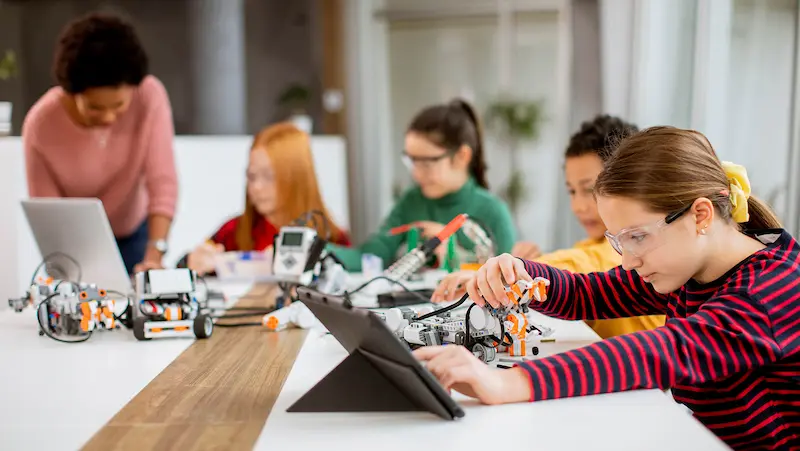
 We are an army of educators and passionate learners from BrightChamps family, committed to providing free learning resources to kids, parents & students.
We are an army of educators and passionate learners from BrightChamps family, committed to providing free learning resources to kids, parents & students.









